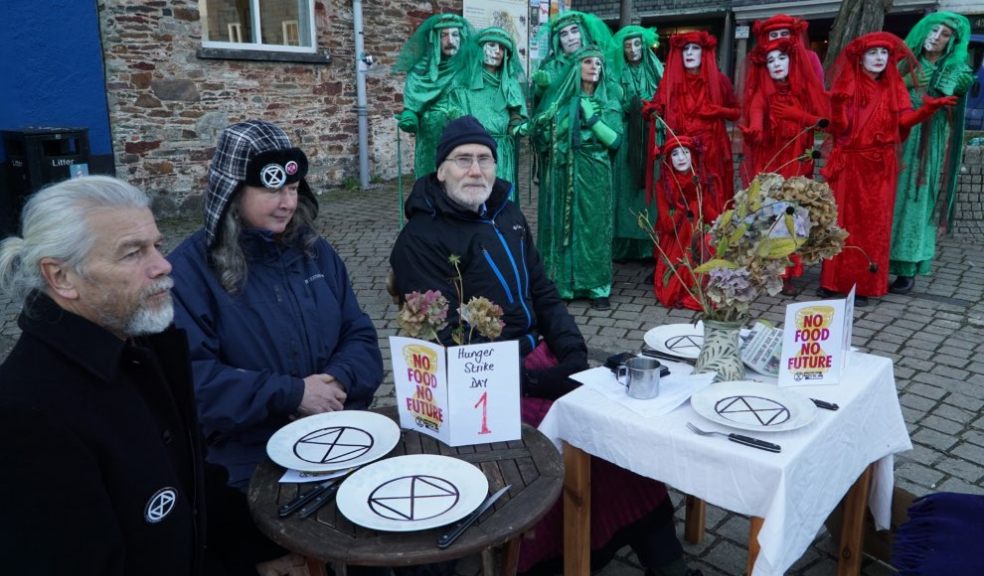
Totnes residents go on hunger strike for climate
Two people will go on hunger strike in Totnes this week to demand swift and decisive government action on the climate and ecological emergency.
Colin Moore, 65, and Stefan Karpik, 70, will fast for several days starting Monday 18 November, as part of an international hunger strike coordinated by Extinction Rebellion (XR).
Colin, a retired teacher from Totnes, plans to strike for five days. Refusing all food is a serious matter, he said:
“We will be drinking water and taking on electrolytes, but no food.”
“One of the big issues will be warmth, because if you’re not burning food you don’t keep warm as well.”
Stefan, a retired social worker, also from Totnes, will strike for seven days from Monday.
“Last week, 11,000 scientists warned of ‘untold suffering’ to come if more work is not done [to tackle the climate crisis],” he said.
“I am relieved that I am doing something about the looming catastrophe, but sad I have to resort to this.”
Colin and Stefan may be joined by others, who are considering fasting for a day or two in solidarity. Dr. Larch Maxey, also from Totnes, will be hunger striking in London.
At least 230 people from 22 countries have committed to go without food for a week or more as part of the international strike.
All have filled in a registration form for health and safety reasons and XR are imposing a strict 24-hour fasting limit for participants under 18, who must have both medical and parental consent to take part.
The hunger strike will mark the launch of the ‘Election Rebellion’, a series of disruptive actions in the run-up to the UK general election on 12 December focusing on our vulnerability to the climate and ecological emergency.
Strikers are aiming to draw attention to XR’s Three Demands Bill on climate and biodiversity and call upon all UK political parties and candidates to support it and ensure it becomes law.
On Monday, members of Totnes and Area XR Hunger Strike team sent a letter to the Labour, Conservative and Liberal Democrat election candidates for the South Hams constituency, asking them to support the Three Demands Bill.
The Bill calls for governments to:
- Tell the truth by declaring a climate and ecological emergency and do all in their power to communicate the urgency for change.
- Promote policies to halt biodiversity loss and reduce greenhouse gas emissions to net zero by 2025.
- Create and be led by the decisions of a citizens’ assembly on climate and ecological justice.
A citizens’ assembly is a collection of ordinary people chosen at random and brought together to deliberate, much like a jury.
Citizens’ assemblies have a proven track record of making robust decisions around complex issues that reflect the views of the populations they are drawn from.
In Ireland, a citizens’ assembly accurately predicted the outcome of a subsequent referendum on abortion laws.
“Many people have seen the difficulty that people have in getting their voices heard,” said Colin.
“This is the problem with the first-past-the-post system. It means that very often what really needs to get done isn’t getting done. In this case it’s responding wisely to the climate and ecological emergency.
“So we need a citizens’ assembly to be free from the vote-catching that goes on with political parties. And we need that citizens’ assembly to be informed by expert opinion and guided by critical thinking processes.”
“Having a citizens’ assembly with some teeth is absolutely crucial, in my view, to addressing the problems that we face.”
Although a UK citizens’ assembly on climate change of 110 people will be held early next year, the decisions it makes will not be legally binding. XR is calling for an assembly whose recommendations pass into UK law.
The hunger strike also aims to highlight the vulnerability of our food supplies.
Along with water shortages, floods, wildfires, threats to security and strain on our emergency services, the climate crisis threatens the planet’s food supply with extreme weather – from drought to ever more dangerous and destructive storms.
“Hunger is already a feature for many people around the world already and some of that is undoubtedly due to failed crops as a result of climate change,” said Colin.
“If we carry on as we are there will be enormous problems. There will be failed crops, food insecurity, starvation, mass migration and mass death. Already around the world that is happening.”
“Even in this country, recent reports have shown that the very wet autumn has affected the potato crop, and the broccoli crop, and the cauliflower crop, the wheat crop also. So food insecurity is coming. Hunger is coming. It’s already arrived for millions around the world and it’s coming to this country, too.”
Stefan said: “By 2050, the government’s belated carbon neutral target, we will be dying of starvation rather than natural causes.”
“I am lucky that I can choose to fast; many more youngsters will be forced into this.”




















